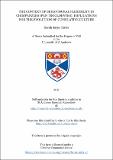Files in this item
The context of behavioural flexibility in chimpanzees (Pan troglodytes) : implications for the evolution of cumulative culture
Item metadata
| dc.contributor.advisor | Whiten, Andrew | |
| dc.contributor.author | Davis, Sarah Jayne | |
| dc.coverage.spatial | 1 v. (various pagings) | en_US |
| dc.date.accessioned | 2018-10-22T13:26:23Z | |
| dc.date.available | 2018-10-22T13:26:23Z | |
| dc.date.issued | 2017-06-20 | |
| dc.identifier.uri | https://hdl.handle.net/10023/16297 | |
| dc.description.abstract | Cumulative culture is rare, if not altogether absent in non-human species. At the foundation of cumulative learning is the ability to flexibly modify, relinquish or build upon prior behaviours to make them more productive or efficient. Within the primate literature, a failure to optimise solutions in this way is often proposed to derive from low-fidelity copying of witnessed behaviours, sub-optimal social learning heuristics, or a lack of relevant socio-cognitive adaptations. However, humans can also be markedly inflexible in their behaviours, perseverating with, or becoming fixated on outdated or inappropriate responses. Humans show differential patterns of flexibility as a function of cognitive load, exhibiting difficulties with inhibiting suboptimal behaviours when there are high demands on working memory. Here I present a series of studies on captive chimpanzees which show that not only is inhibitory control compromised in chimpanzees, but indicate ape behavioural conservatism may be underlain by similar constraints as in humans; chimpanzees show relatively little conservatism when behavioural optimisation involves the inhibition of a well-established but simple solution, or the addition of a simple modification to a well-established but complex solution. In contrast, when behavioural optimisation involves the inhibition of a well-established but complex solution, and especially when the alternative solution is also complex, chimpanzees show evidence of behavioural conservatism. I propose that conservatism is linked to behavioural complexity, potentially mediated by cognitive resource availability, and may be an important factor in the evolution of cumulative culture. | en_US |
| dc.language.iso | en | en_US |
| dc.publisher | University of St Andrews | |
| dc.rights | Attribution-NonCommercial-NoDerivatives 4.0 International | * |
| dc.rights.uri | http://creativecommons.org/licenses/by-nc-nd/4.0/ | * |
| dc.subject | Cumulative culture | en_US |
| dc.subject | Chimpanzees | en_US |
| dc.subject | Social learning | en_US |
| dc.subject | Behavioural flexibility | en_US |
| dc.subject | Decision making | en_US |
| dc.subject | Comparative cognition | en_US |
| dc.subject | Conservatism | en_US |
| dc.subject.lcc | QL737.P94D2 | |
| dc.subject.lcsh | Chimpanzees--Behavior | en |
| dc.subject.lcsh | Social evolution in animals | en |
| dc.subject.lcsh | Social learning | en |
| dc.subject.lcsh | Decision making in animals | en |
| dc.title | The context of behavioural flexibility in chimpanzees (Pan troglodytes) : implications for the evolution of cumulative culture | en_US |
| dc.type | Thesis | en_US |
| dc.contributor.sponsor | Templeton Foundation | en_US |
| dc.type.qualificationlevel | Doctoral | en_US |
| dc.type.qualificationname | PhD Doctor of Philosophy | en_US |
| dc.publisher.institution | The University of St Andrews | en_US |
The following licence files are associated with this item:
This item appears in the following Collection(s)
Except where otherwise noted within the work, this item's licence for re-use is described as Attribution-NonCommercial-NoDerivatives 4.0 International
Items in the St Andrews Research Repository are protected by copyright, with all rights reserved, unless otherwise indicated.


